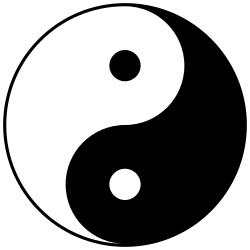Monáda
Slovo monáda (podle řeckého monos) má několik významů.
- Monáda (řecká filosofie) je termín užívaný antickými filozofy Pythágorem, Parmenidem, Xenofánem, Platónem, Aristotelem a Plotínem jako termín pro Boha, první bytost, nebo veškeré bytí.
- V monismu je to koncept jediné podstaty metafyzické a teologické teorie.
- V gnosticismu je to prvotní Božské hledisko.
- Monády jsou základním pojmem filosofie Gottfrieda Leibnize. Monadologie je název knihy tohoto autora.
- Čínská monáda je symbol
 vyjadřující princip Jin a Jang.
vyjadřující princip Jin a Jang. - Monády jsou zastaralým alternativním pojmenováním prvoků; termín přetrvává v biologickém názvosloví v některých složeninách (např. kryptomonády).
- Monády ve funkcionálním programování
Média použitá na této stránce
Yin yang.svg
This is the Taijitu (太極圖), with black representing yin and white representing yang. It is a symbol that reflects the inescapably intertwined duality of all things in nature, a common theme in Taoism. No quality is independent of its opposite, nor so pure that it does not contain its opposite in a diminished form: these concepts are depicted by the vague division between black and white, the flowing boundary between the two, and the smaller circles within the large regions.
This is the Taijitu (太極圖), with black representing yin and white representing yang. It is a symbol that reflects the inescapably intertwined duality of all things in nature, a common theme in Taoism. No quality is independent of its opposite, nor so pure that it does not contain its opposite in a diminished form: these concepts are depicted by the vague division between black and white, the flowing boundary between the two, and the smaller circles within the large regions.
